|
|
|
Sort Order |
|
|
|
Items / Page
|
|
|
|
|
|
|
| Srl | Item |
| 1 |
ID:
158540
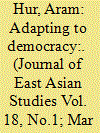

|
|
|
|
|
| Summary/Abstract |
Defection from North Korea to South Korea has increased dramatically, but little is known of its political consequences. Do North Korean defectors successfully adopt democratic norms, and if so, what factors aid this process? Through a novel survey of defectors, I find that national identification plays a significant role in motivating their fledgling sense of democratic obligation. Greater feelings of national unity with South Koreans lead to a stronger duty to vote and otherwise contribute to the democratic state. This effect is more powerful than that of conventional contractual factors, on which most state resettlement policies are based, and is surprising given that defectors’ nationalist socialization mostly took place under the authoritarian North. The findings suggest the need to reconsider integration approaches toward North Korean defectors and similarly placed refugees elsewhere.
|
|
|
|
|
|
|
|
|
|
|
|
|
|
|
|
| 2 |
ID:
132953
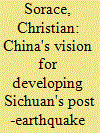

|
|
|
|
|
| Publication |
2014.
|
| Summary/Abstract |
In the aftermath of the 2008 Wenchuan earthquake, government officials, scholars and outside observers eagerly hoped that the emergency relief and reconstruction process would bring about the emergence of civil society and increase grassroots democratic participation. Contrary to this optimistic assessment, this article contends that the local state used the opportunity of the disaster as an experimental laboratory to implement an array of already existing national development plans. The urgency with which the reconstruction was to be completed and the opportunities to meet national development targets as well as access reconstruction funds were too tempting to resist. However, the ham-fisted Leninist implementation style met with local resistance and has contributed to a significant deterioration in local state-society relations. The fact that many local residents continue to question why, despite the huge resources invested by the state in the reconstruction project, they have yet to see any improvement in their economic and overall living conditions points to a deficit of local participation and a breakdown in political communication and trust. By focusing on the different political economies of disaster reconstruction, this article attempts to illuminate the regime's vision for developing the countryside, rural politics, and state-society relations in China more broadly. Unless the state is able to incorporate local needs into its development plans, it will not win the trust and support of local residents, regardless of the amount of money it invests or the benevolence of its intentions.
|
|
|
|
|
|
|
|
|
|
|
|
|
|
|
|
| 3 |
ID:
159582
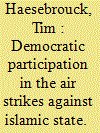

|
|
|
|
|
| Summary/Abstract |
Although over sixty partners have joined the US-led coalition against the Islamic State (IS), only a handful of states was willing to carry out air strikes against IS-targets. This article aims to explain the pattern of democratic participation in the air campaign. It builds on the rich literature on military burden sharing and democratic peace theory to develop a multi-causal model, which is tested with Qualitative Comparative Analysis. The results of the analysis suggest that the pattern of participation in the air strikes results from a complex interplay between alliance politics, threat perception and domestic institutional constraints. The threat posed by foreign fighters and a strong interest in a good relationship with the US constituted important incentives to participate in the air strikes, while a high level of parliamentary involvement in military deployment decisions inhibited participation. Furthermore, states that were situated in Russia's immediate vicinity refrained from participating, in spite of their strong dependence on the US' security guarantee. Lastly, the analysis did not provide convincing evidence that partisan politics had an impact on participation in the air strikes.
|
|
|
|
|
|
|
|
|
|
|
|
|
|
|
|
| 4 |
ID:
047051
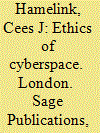

|
|
|
|
|
| Publication |
London, Sage Publications, 2000.
|
| Description |
xi, 207p.
|
| Standard Number |
9780761966692
|
|
|
|
|
|
|
|
|
|
|
|
Copies: C:1/I:0,R:0,Q:0
Circulation
| Accession# | Call# | Current Location | Status | Policy | Location |
| 044469 | 303.4833/HAM 044469 | Main | On Shelf | General | |
|
|
|
|
| 5 |
ID:
189134
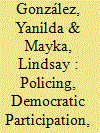

|
|
|
|
|
| Summary/Abstract |
Can democratic participation reduce inequalities in citizenship produced by policing? We argue that citizen participation in policing produces a paradox, which we call asymmetric citizenship. For some citizens, expanding participation in policing expands citizenship by enhancing state responsiveness to demands. Yet citizen participation in policing often produces demands to repress marginalized groups, thereby contracting their citizenship rights. We theorize that formal spaces for citizen participation in policing produce asymmetric citizenship through three mechanisms: (1) defining some groups as “virtuous citizens” and labeling marginalized groups as “security threats,” (2) gatekeeping to amplify the voice of “virtuous citizens” while silencing marginalized groups, and (3) articulating demands for police repression of marginalized groups to protect the rights of “virtuous citizens.” We illustrate the framework through a qualitative analysis of São Paulo’s Community Security Councils. Our analysis elucidates mechanisms through which democratic participation can reproduce, rather than ameliorate, inequality in policing.
|
|
|
|
|
|
|
|
|
|
|
|
|
|
|
|
| 6 |
ID:
165945
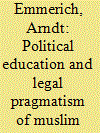

|
|
|
|
|
| Summary/Abstract |
This article discusses the involvement of Muslim organizations in disseminating political education and legal pragmatism in India. Drawing on qualitative fieldwork between 2011 and 2015, this study contributes to a better theoretical understanding of how Muslim organizations engage in democratic processes, rather than being perceived as opposed to notions of democratic participation, by examining the Popular Front of India’s promotion of rights consciousness among its followers.
|
|
|
|
|
|
|
|
|
|
|
|
|
|
|
|
| 7 |
ID:
144830
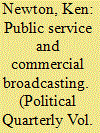

|
|
|
|
|
| Summary/Abstract |
This article provides an accessible overview of the growing research literature on the impact of public service and commercial broadcasting and highlights its main implications for policy discussions about the future of public service broadcasting in Western societies. It shows that the populations of countries with public service broad- and narrowcasting are better informed about government and politics, are more trusting of other people, have more positive civic attitudes, have greater confidence in democratic institutions and are more likely to engage in democratic politics. Moreover, levels of social trust are higher in countries which have a significant public service element in their media systems, even among individuals who do not habitually watch public TV channels. The article ends with a brief discussion of the implications of this research for the future of public broadcasting in the Western world.
|
|
|
|
|
|
|
|
|
|
|
|
|
|
|
|
| 8 |
ID:
180019
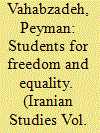

|
|
|
|
|
| Summary/Abstract |
The emergence and rapid but short-lived presence of Students for Freedom and Equality (SFE; in Persian: Daneshjuyan-e Azadikhah va Barabaritalab or DAB) across major Iranian campuses and their fateful 4 December 2007 protest rally on the campus of the University of Tehran speaks of the return of leftist student activism to Iranian campuses after almost two decades of absence or invisibility within the context of post-revolutionary Iran. SFE was an umbrella democratic organization: its activists came from a plurality of social and political backgrounds and adhered to diverse leftist ideas. But in the context of pro-Reform Movement student activism in Iranian post-secondary institutions in the late 1990s and in 2000s, for a short time the SFE tried to hegemonize student activism and challenge the various pro-government tendencies in university campuses. Before state repression forced the SFE out of operation in 2007, Students for Freedom and Equality brought to campuses candid discussions of social justice issues, critique of Iran’s neoliberal economic policies, and challenges to censorship and lack of freedom.
|
|
|
|
|
|
|
|
|
|
|
|
|
|
|
|
|
|
|
|
|